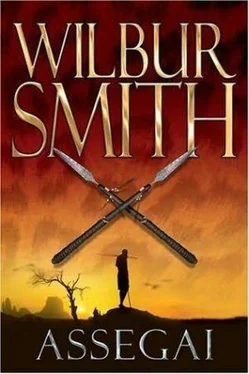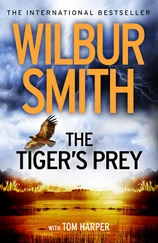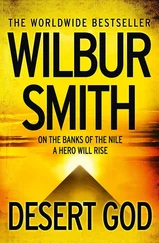He turned back for the eastern shore. Lake Natron overlapped the boundary between the German and British territories. At this dry season of the year the beaches were exposed and as the water was rich in soda they were brilliant white, the soda hard-packed. Leon could land the Butterfly safely on one of them. The difficulty lay in deciding which to trust. He made a pass down a stretch of beach, which seemed firm and hard, came around again and touched down gently. The Butterfly settled and began to slow. Then, heart sinking, he felt her wheels break through the soda crust into the soft mud beneath. The plane stopped so abruptly that they were all thrown heavily against their safety straps.
Leon cut the engines and they climbed down on to the beach. A hasty inspection revealed no apparent damage to the landing gear or fuselage, but the wheels were bogged axle deep in the mire. Leon walked in a circle around the Butterfly to test the surface. They had been unfortunate to run into a small mudhole. Fifty feet ahead the ground was firm, but there was no hope of the four men being able to manhandle the heavy machine that far.
‘Where are we, Manyoro?’
The two Masai discussed the question before they replied.
‘We are in the land of the Bula Matari. It is half a day’s walk back to the border.’
‘Are there any Germans close by?’
Manyoro shook his head. ‘The nearest post is at Longido.’ He pointed south-east. ‘It will take more than a day for the soldiers to get here.’
‘Are there any villages close by where we can find men to help us?’
‘ Ndio , M’bogo. Less than an hour’s walk along the shore from here there is a large village of fisherfolk.’
‘Do they have trek oxen?’
Manyoro consulted Loikot and at last they both nodded. ‘Yes. It is a large village and the chief is a rich man. He has many oxen.’
‘Go to him, my brethren, as fast as you can run. Tell him if he brings a span of his oxen to pull us out of the mud I will make him even richer. He must bring ropes too.’
Leon and Max settled down in the cockpit to wait, but dense clouds of mosquitoes whined around their heads and kept them awake until dawn. At last they heard voices and the lowing of oxen from the direction in which Manyoro and Loikot had disappeared. Then a crowd of people and animals came towards them along the shore. Manyoro was in the vanguard, trotting far ahead.
Leon jumped down from the cockpit and hurried to meet him.
‘I have brought two full spans of oxen.’ Manyoro was grinning with his accomplishment as they came together.
‘I praise you, Manyoro. You have done work of great value. Have they brought ropes?’ Leon asked.
Manyoro’s smile faded. ‘Only short leather traces, which will not stretch across the mudhole to our indege ,’ he admitted. He tried to look downcast, but Leon had seen the twinkle in his eyes.
‘A man of such wisdom as you must have thought of another plan?’ Leon asked.
Manyoro gave his sunniest smile.
‘What have you brought me, brother?’
‘Fishing nets!’ he cried, and dissolved into a gale of giggles. ‘That is a very good joke,’ Leon said, ‘but now tell me the truth.’
‘It is the truth.’ Manyoro staggered weakly with an excess of mirth. ‘You shall see, M’bogo, you shall see, and then you will praise me even more.’
The thirty-six oxen were driven down the lake shore by several hundred fisherfolk, with their women and children. On the back of each ox was strapped an enormous brown bundle of some amorphous material. Under Manyoro and Loikot’s stern supervision, the bundles were unloaded and laid out on the beach. When they were unrolled they proved to be two-hundred-foot lengths of hand-woven netting. The mesh was little more than an inch across and the knots were neat and firm. Leon stretched a section over his shoulders and tried with all his strength to break it. The villagers danced and hooted when he turned red with his vain efforts.
‘Look at his face!’ they told each other. ‘It is the colour of a turkey buzzard’s wattles. Our nets are the finest and strongest in the land. Even the largest crocodiles cannot tear them.’
The nets were laid out, joined together, then carefully rolled into a long, bulky hawser two or three feet in diameter, thicker and heavier than the mooring ropes of an ocean liner. Gangs of villagers carried one end out to where the Butterfly stood, her wings canted at a forlorn, abandoned angle. Leon wound the end around the landing gear and secured it with the leather thongs that the villagers had brought with the nets. The teams of oxen were backed to the edge of the mud and inspanned to the far end of the hawser. Leon, Max and the two Masai took up positions at each of the Butterfly ’s wing-tips to prevent her rocking dangerously and digging one into the mud. Then, with shouts of encouragement from the onlookers and the cracking of whips by the drivers, the oxen heaved. The hawser lifted from the mud and came up straight and hard. For a minute nothing further happened, but then, gradually, the landing wheels broke out of the mud and the Butterfly trundled on to dry ground.
When the hysteria of celebration and self-congratulation abated, Leon gave the village headman a generous gift, sufficient to purchase several more oxen. Then he bade Max farewell and watched him set off jauntily on foot for the German police post at Longido, his rucksack on his back. As soon as he had disappeared into the bush, Leon and the Masai started the Butterfly ’s engines and climbed into the cockpit. When he was airborne, Leon turned north on to a heading for Nairobi.
The following days were feverishly busy as Leon reported to Lord Delamere and took over his new job as his lordship’s intelligence and liaison officer. Despite all this distraction, Eva was never far from his mind. Her image rose unexpectedly to haunt him at odd hours of his day.
When Penrod left for his new assignment in Egypt Leon was at the railway station to see him off. Their relationship had cooled noticeably since Eva had come between them. At the last moment, as they stood on the railway platform and the train conductor gave a blast on his whistle, Leon could contain himself no longer. Once again he asked his uncle if there was any way in which he could contact Eva now that Germany and Britain were at war and all regular channels of communication had been closed.
‘You should forget about that young lady. I’ve pulled your irons out of the fire once already and I don’t want to be forced to do it again. She can bring you nothing but trouble and heartbreak,’ Penrod replied, and climbed up on to the balcony of his carriage. ‘I shall give your love to your aunt. That will please her.’
It was almost a week later and Leon was leaving Lord Delamere’s office in the Barclays Bank building. As he stepped out through the main doors into the road he felt a small soft hand press into his. Startled, he looked down – into the huge dark eyes of a Vilabjhi cherub. ‘Latika! My sweet lollipop!’ he greeted her.
‘You remembered my name,’ she exclaimed, with delight.
‘Of course I did. We’re friends, aren’t we?’
Only then did she remember her errand. She placed a small folded square of paper in his hand. ‘My daddy said I should give this to you.’
Leon unfolded it and read quickly: ‘I must speak to you. Latika can bring you to my emporium as soon as you can come. Signed by Mr Goolam Vilabjhi Esq.’
Latika was tugging at his hand, and he allowed her to lead him away to where his horse stood at the hitching rail down the street. He mounted, then reached down from the saddle to take the child under her armpits and lift her behind him. She clasped him around the waist, and they rode the length of the street with Latika squeaking and wriggling ecstatically.
Читать дальше












